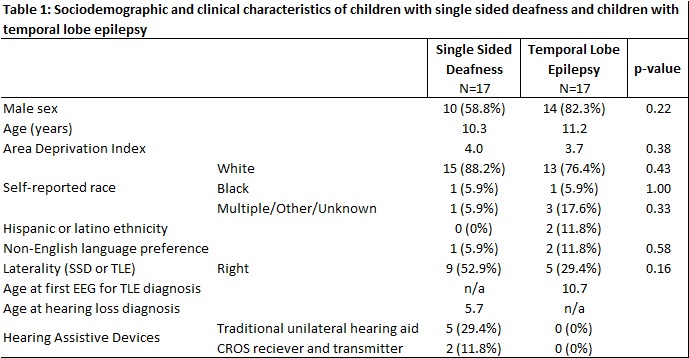Neonatology
Session: Neonatal Neurology 10: Neurodevelopment
358 - Comparing Cognition in School-Aged Children with Single-Sided Deafness to Children with Temporal Lobe Epilepsy
Monday, May 6, 2024
9:30 AM - 11:30 AM ET
Poster Number: 358
Publication Number: 358.3045
Publication Number: 358.3045

Emily S. Taketa, BS (she/her/hers)
Medical Student
University of California, San Francisco, School of Medicine
San Francisco, California, United States
Presenting Author(s)
Background: While single-sided deafness (SSD) and temporal lobe epilepsy (TLE) have different pathophysiologies, both have been associated with decreased auditory processing. Children with SSD have increased difficulty with sound localization and auditory function. Despite normal hearing levels, TLE patients have decreased dichotic listening and temporal processing. Yet, the impact of these auditory changes on cognitive functioning in school age children is uncertain. We hypothesize similar cognitive profiles in SSD and TLE given they both have auditory differences.
Objective: To compare the cognitive functioning of school-age children with SSD to children with TLE on a standardized, norm-referenced cognitive measure.
Design/Methods: This study included 17 children with SSD and 17 age-matched children with TLE and normal hearing. Sociodemographic and cognitive data were collected from medical records. Cognitive functioning was measured with the most frequently administered subtests on the fourth or fifth edition of the Wechsler Intelligence Scale for Children (WISC) during a clinical encounter. Scaled scores on subtests and one composite score were compared via paired t-tests.
Results: The 17 children with SSD have an average age of 10 years old, an average Area Deprivation Index (ADI) state decile of 4, and 88.2% self-identified as white. The 17 children with TLE have an average age of 11 years old, an average ADI state decile of 3.7 indicating a more advantaged background compared to the SSD group, and 76.4% self-identified as white (Table 1). In both cohorts, subtests scored within the average range across domains of cognitive functioning (ss=8-12), and there was no statistically significant difference between any of the subtest scores. Qualitatively, all subtests' scaled scores were higher, indicating stronger cognition, in the children with SSD in comparison to the children with TLE (Table 2).
Conclusion(s): Among school-aged children with SSD, there was no statistically significant difference in cognitive abilities when compared to children with TLE and normal-level hearing. However, children with TLE scored on average 1-2 points lower across almost all WISC-IV/WISC-V domains. Both groups exhibited the lowest performance in processing speed, which may be a proxy for brain white matter development. Literature indicates that SSD and TLE patients undergo brain reorganization to compensate for unilateral auditory input and unilateral temporal lobe injury, respectively. Future research should investigate whether cognitive profiles are indicative of brain reorganization in these groups.


.jpg)
